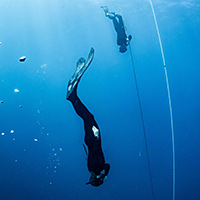Yesterday was World Ocean Day. Yet, as many of us know, World Ocean Day is every day for us and other marine conservationists. We wake up and work tirelessly on protecting the ocean, whether it is through preparing for the upcoming season, creating social media content, or sorting administrative tasks (often on a volunteer basis aside outside our regular jobs!) We are privileged to dedicate our lives to this worthy cause yet, at the same time, we all should be doing what we can. Because time is running out and we need as much expertise, and hands available, to fight for this.
The interest is there. The passion is there. As a proof, I can say I receive countless emails and messages of likeminded people wanting to contribute to the project. Yet, to me, there is one gap that still needs to be bridged. There are plenty of university courses on how to collect data, how to analyse data, how to become a biologist, let’s say. I myself pursued one of these courses to earn good baseline experience as a scientist. But how does one learn how to write a business plan? To manage a team? Or to create content for social media? If we want to succeed, marine conservation needs help, and training.
The emails I receive are, for the most part, from young biologists who have just finished their studies and want an opportunity…ideally, a paid one. But as a grassroots, small organisation mainly composed of volunteers, I seek expertise that will fill the holes we have. The expertise I look for is usually found as someone’s hobby or as talent: something that person is doing rather well but that they might not see as important and may not talk about initially. And I think that is where the issue is. As young professionals in a changing world, we need to develop these other skills: to stand out but also because, realistically, these very skills will change the world more than learning how to use a statistical program.
I believe society has a way of putting us into boxes, and sadly, for conservation, it seems it is only as a biologist that we can pursue this career. Yet things are changing, and we need more project management training, more communication specialists, more business-oriented approaches to become self-sustainable financially as organisations, and more alternative, multi-disciplinary methods to train the next generation of conservationists.
Personally I have been wondering how to do this for a long time. Eventually we came up with an idea: one that officially came to life yesterday. Through an online page I will be sharing what is really happening behind the scenes of the project, our achievements and our struggles, but also discuss with other conservationists how to address the issues within our sector.
I am specifically choosing people who pursued a different career, following their talent or passion instead of the typical path, and who founded their organisation or project thanks to grit and hard work. I wish this resource had been available earlier for me to use, as really we only hear stories of success and dreams coming true in conservation, and less about the discipline and guts it took to do something different. We ask for a small donation in exchange so that we can keep creating content and fundraise for the project at the same time.
I hope that, through this, we can inspire more budding conservationists, or people making a career change, to trust their gut and go with what they truly love doing. You’d be surprised how much varied expertise it takes to run an organisation and make a difference.
I hope you like it! Please do reach out if you’d want certain topics to be covered.
More about how we train conservationists on the ground in Madagascar soon, we have many exciting things happening this year. I have also give talks and write about this specific topic here.
Stella
Founder and Director
 juin 09, 2022
juin 09, 2022